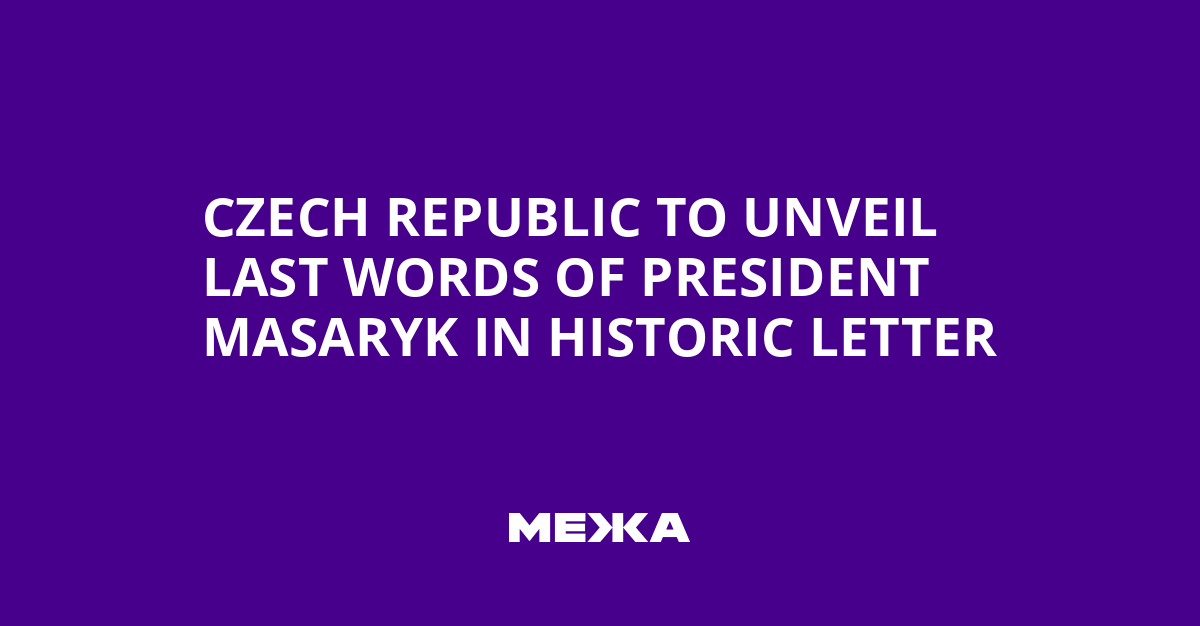The citizens of the Czech Republic eagerly await the unraveling of an old mystery: what were the last words of their first president, Tomáš Garrigue Masaryk.
According to Czech public radio, the final thoughts of the statesman who led Czechoslovakia from 1918 to 1935 were likely recorded by his son Jan Masaryk on the eve of his death in September 1937, and since then they have remained sealed in a single letter. The radio created a dedicated section on its website to highlight the envelope’s unveiling, scheduled for Friday.
Historian Dagmar Hajkova, head of the Department of Modern Social and Cultural History at the Masaryk Institute and Archives of the Czech Academy of Sciences, told the station that Jan, presumably, noted his sick father’s words at his bedside.
“If you imagine the moment, he could have written this on his knee, hastily, nervously, so the handwriting might be unreadable. It could also be more fragmentary and not in the form of a clear speech”
– Dagmar Hajkova
The Envelope’s Chronicle and Its Fate
Masaryk had been ill since 1934, Hajkova noted, so there are grounds to believe the envelope could have been created before 1937, when it seemed that the president might not live to the end of his life.
Although the contents of the letter are now known only in part, its subsequent fate is well documented. After Jan Masaryk died under suspicious circumstances a few days after the Soviet coup of 1948, he left the letter to his secretary Antonina Sum. Sum carried it abroad, as the country became a Soviet satellite in the postwar period.
Sum and Lumír Soukup, another former personal secretary of Jan Masaryk, kept the letter for decades before handing it over to the Czech National Archives in 2005 with the condition that it would remain sealed for 20 years.
What the Public Can Expect During the Unveiling
This period ends on September 19, and Czechs will finally learn what their first president said before his death. The case of the enigmatic envelope has sparked a wave of interest nationwide: major Czech media are covering the event, and social networks are filled with speculation about the letter’s content.
Many expect wise counsel or predictions from Masaryk, perhaps warnings about the approach of war or a threat from Russia.
“I don’t think it will be political. Maybe something about intergenerational relations?”
– Lenka Lubíková
Others are seeking a more practical message. Teacher Klára Voláková yesterday asked her students in class what they think about who might be inside the letter.
“They let their imaginations run free, and I got answers like: ‘a recipe for svíčková (the traditional Czech dish), strudel or other delicacies, or possible information about his father,’” she said, pointing to the long-standing, and widely debunked conspiracy theory that Masaryk is actually the son of Austrian Emperor Franz Joseph I.
– Klára Voláková
The letter will be unveiled during a ceremonial at Lány Castle, located about 50 kilometres west of Prague, with the participation of current president Petr Pavel and a live broadcast by Czech state radio. Masaryk, often referred to as TGM, left a deep mark on history – as the founder of independent Czechoslovakia after the dissolution of Austria-Hungary. He was a philosopher and educator by training, but his leadership role at the time made him one of the most revered figures in modern Czech history.
Today Masaryk is seen as a symbol of the fusion of intellect with practical leadership, a person who kept close ties to the people even after the country became a major player in European politics. The unveiling of the letter at Lány Castle will be not only a historic event but also an opportunity for a new look at the legacy of this notable leader.
